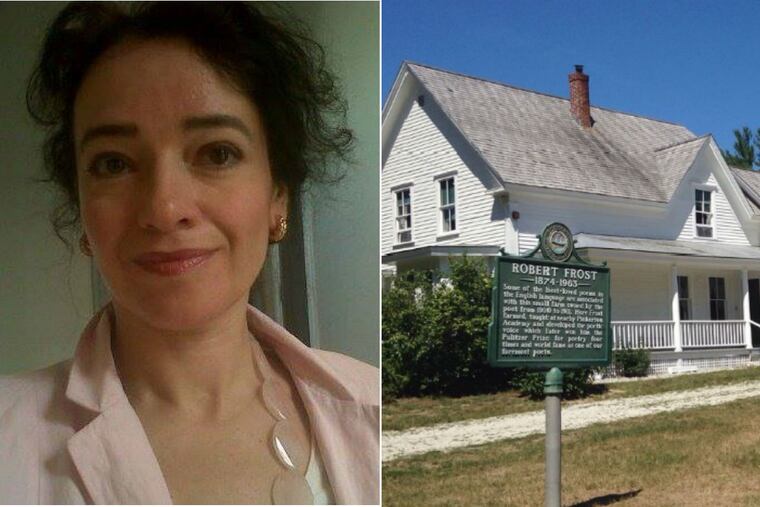Bryn Mawr alum wins prestigious Frost Farm poetry prize
Susan de Sola's blank verse poem "Buddy" has won the eighth annual Frost Farm Prize for metrical poetry. Frost Farm is the site of the farm where Robert Frost lived and wrote from 1900-1911. De Sola talks about her poem and the story it tells, which includes her Bryn Mawr days.

"Buddy had loved me long, but from afar."
That's a pretty good first line. It makes you want to read on, to see what happens, if anything, between Buddy and the "me" who's speaking.
And it's in iambic pentameter. More on that in a minute.
It's the first line of "Buddy" by accomplished poet and 1984 Bryn Mawr grad Susan de Sola. "Buddy" has been awarded first prize for metrical poetry in the eighth annual Frost Farm poetry contest, out of 1,123 total submissions.
If you see the name Frost and think Robert, you're right: Frost Farm is the site of Robert Frost's Derry, N.H., home and farm from 1900-1911.
It's a young prize, but the association with four-time Pulitzer winner Frost, and the tradition of poetry written in verse, give it a cachet like few other prizes.
"I was very surprised!" writes de Sola via e-mail. She lives in Amsterdam in the Netherlands these days with her husband and five children. "The Frost Farm Prize is one of the few prizes dedicated to metrical poetry, which encouraged me to submit 'Buddy,' " she says. "I think the story of Buddy had been on my mind for some years, but only took shape when I found the form for it, and when I was ready to write it, of course."
She also credits two local poetry conferences for helping round "Buddy" into shape: blank verse workshops led by Mark Jarman at the West Chester Poetry Conference and by Joshua Mehigan at Poetry by the Sea, a Madison, Conn., conference led by West Chester faculty member Kim Bridgford. At these conferences, she says, she first found out about the Frost Farm prize.
"Buddy" is rich and living proof that not all poetry is open-form or "free verse." The traditional musical forms are still alive, with plenty of kick, tuned to the voices and concerns of our moment. Here's a passage from "Buddy" in which he shows up unannounced:
… hearing that I was newly single,
he surprised me in my dorm, at posh Bryn Mawr.
He'd travelled all that way by motorbike.
He caused a stir. Not knowing what to do,
I took him to the cafeteria,
big Bud absurd with pint of milk and tray,
and slight young preppy fellows gathered round.
One said to me: "I like him. He reminds me
of guys I used to work with, building, summers."
Our small buzz of celebrity. We went
to town en masse for pool and dollar beers.
Tall, side-burned Bud in checks and biker leather,
the sum and magnet of our bourgeois dread,
but there was something wholesome to him always.
He slept on my best girlfriend's floor, without
complaint. I realize now he'd hoped for more.
I didn't think about the miles he'd traveled,
his long-held dream deferred, or aim… busted.
It's conversational, with plenty of humor ("I love humor – a necessity of life," de Sola says) and insight, especially that lovely line that sees biker Buddy as both the "sum" of the bourgie dread of the students and also somehow the "magnet" for it. And that piquant realization that Buddy had "hoped for more." Note, too, the wry echo and twist on Langston Hughes in "his long-held dream deferred, or aim … busted."
The poet graciously acknowledges that "Buddy" tells "the past as I remember it. The 'dollar beers' were enjoyed at Roach's, a bar in Haverford we loved for that reason. I don't know if it still exists." (Roach and O'Brien is indeed still there.)
The speaker's knowledge, de Sola says, "is imperfect, and the poem is, I think, about what does not happen, what does not get revealed, as much as it is about anything. Buddy's name is a mystery, as is his face, his true nature and any possible demons under the banter and the roles. … I think the speaker feels some remorse that she didn't find out more, didn't ask more — when she could."
After Bryn Mawr, de Sola earned a Ph.D. in literature and history at Johns Hopkins. "I loved Bryn Mawr," she says. "It's a remarkable, highly committed college with an idealistic, but flexible, sense of its own mission which attracts strong individuals. The campus is beautiful. I'll always be grateful I was able to study there. Whenever I meet another alum I feel a sense of connection, however different we may be."
She adds that blank verse (iambic pentameter that does not rhyme, as in Shakespeare plays, Milton's Paradise Lost, or many of Frost's greatest poems) is a "marvelous" form that "lets you relax a bit and use idiomatic speech. … On the other hand it is also technically challenging. … It gives some of the freedoms of prose, but still, it is poetry." She says she is "happy people have been touched" by her poem.
Frost was one of the greatest storytellers in blank verse. For two great examples, here are "Home Burial" and "Death of the Hired Man."
It's a busy, triumphant couple of weeks for de Sola. On Thursday, she was in town as a poet in residence at The West Chester Poetry Conference, now under way, concluding Saturday. Then she travels up the Eastern seaboard to Frost Farm, where she receives a $1,000 check and reads at the Frost Farm Poetry Conference in Derry.